Project Proposal: ICT's Impact on Supply Chain Management at Unilever
VerifiedAdded on 2023/01/06
|13
|2705
|81
Project
AI Summary
This project proposal investigates the role of Information Communication Technologies (ICT) in enhancing the efficiency of supply chain management, with a specific focus on Unilever. The project aims to identify the types of ICT used, determine their benefits, assess the importance of supply chain management for Unilever's business performance, and evaluate the relationship between ICT and supply chain efficiency. The proposal includes a literature review exploring various ICT applications and their advantages, such as improved communication and cost reduction. The proposed methodology employs a positivism research philosophy and a deductive approach, utilizing a quantitative survey strategy with a cross-sectional time horizon. Data will be collected through questionnaires administered to 50 Unilever employees, analyzed using frequency distribution analysis and MS-Excel for graphical representation. The project adheres to ethical principles, ensuring confidentiality and informed consent. The anticipated findings are that ICT significantly improves efficiency, enables competitive advantages, and addresses supply chain challenges. The project concludes with recommendations for Unilever based on the research findings.
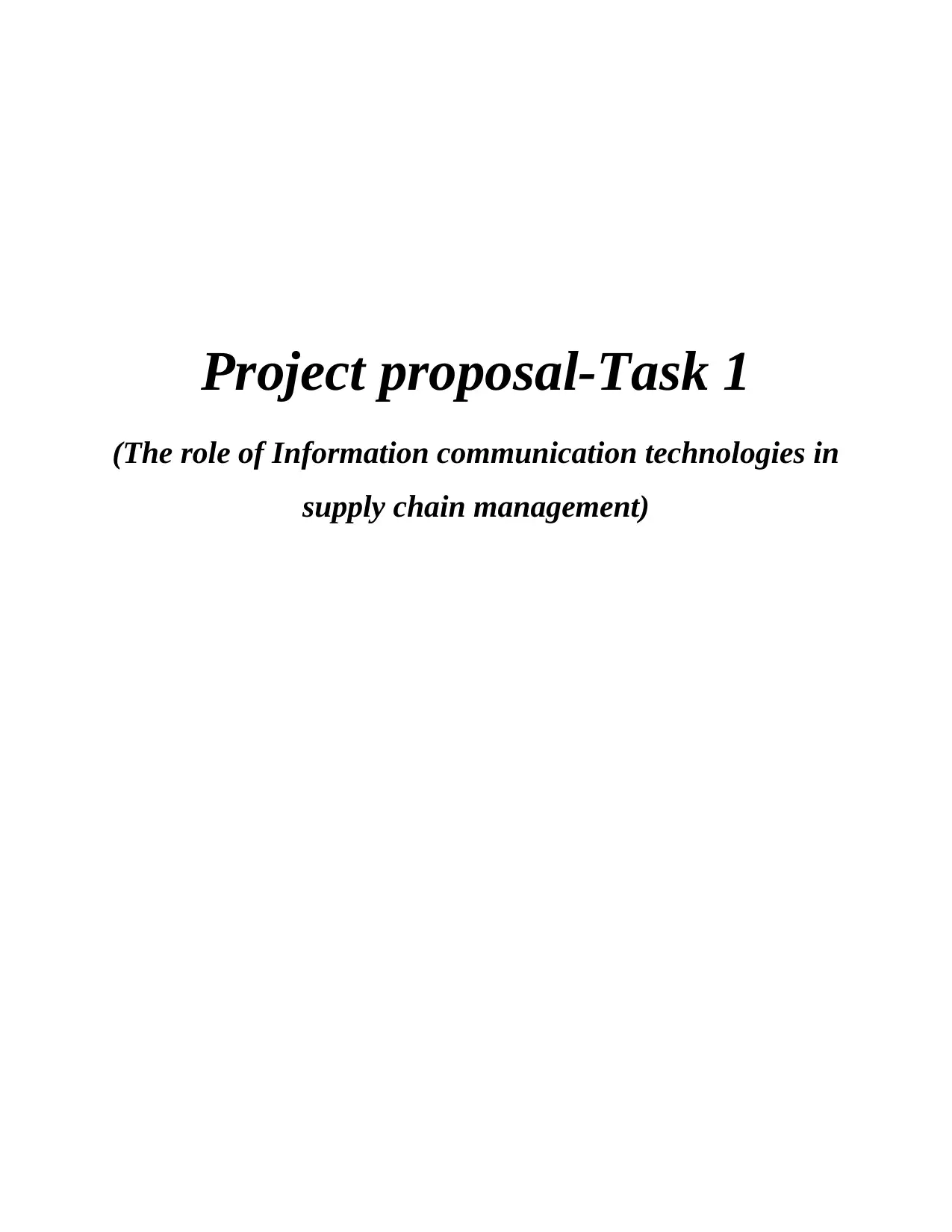
Project proposal-Task 1
(The role of Information communication technologies in
supply chain management)
(The role of Information communication technologies in
supply chain management)
Paraphrase This Document
Need a fresh take? Get an instant paraphrase of this document with our AI Paraphraser
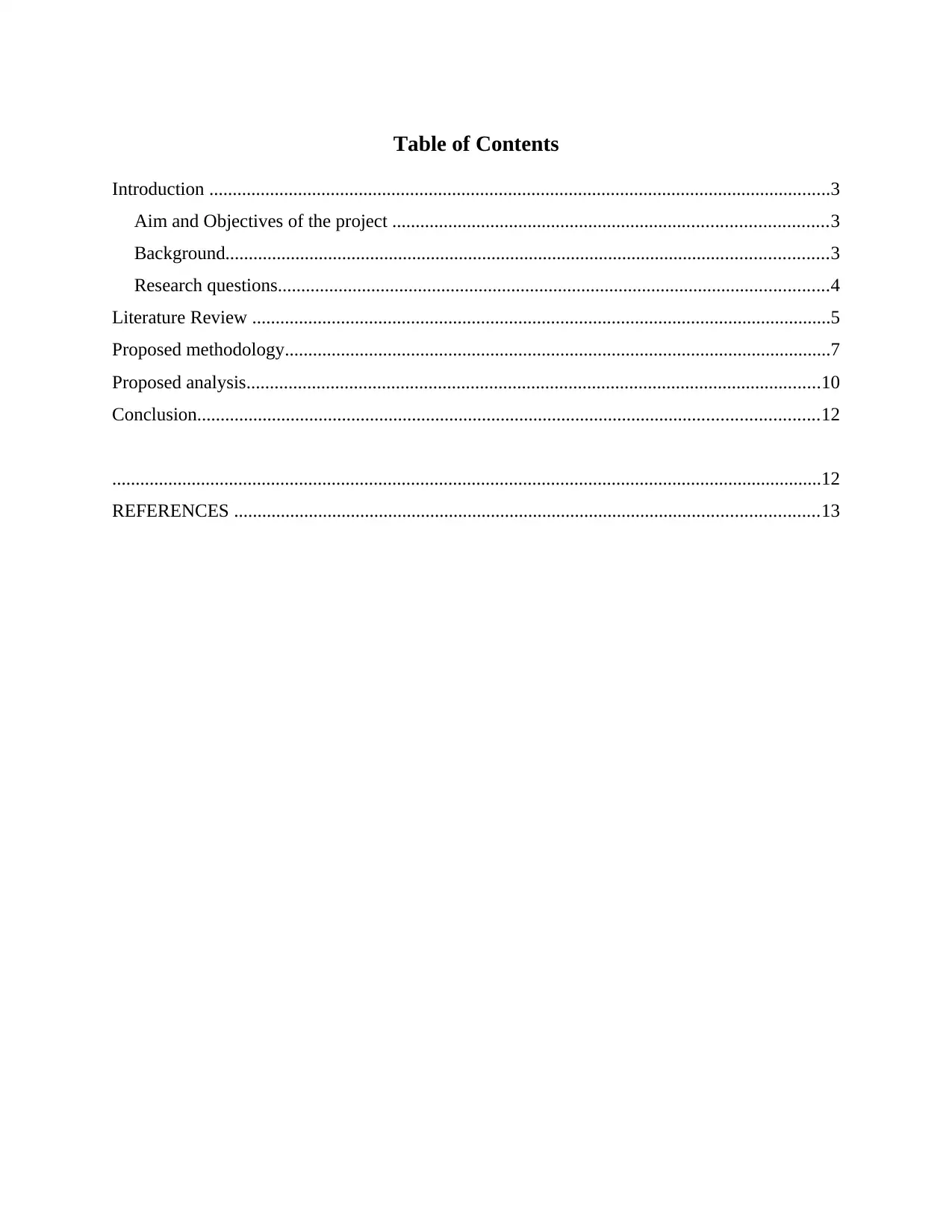
Table of Contents
Introduction .....................................................................................................................................3
Aim and Objectives of the project .............................................................................................3
Background.................................................................................................................................3
Research questions......................................................................................................................4
Literature Review ............................................................................................................................5
Proposed methodology.....................................................................................................................7
Proposed analysis...........................................................................................................................10
Conclusion.....................................................................................................................................12
........................................................................................................................................................12
REFERENCES .............................................................................................................................13
Introduction .....................................................................................................................................3
Aim and Objectives of the project .............................................................................................3
Background.................................................................................................................................3
Research questions......................................................................................................................4
Literature Review ............................................................................................................................5
Proposed methodology.....................................................................................................................7
Proposed analysis...........................................................................................................................10
Conclusion.....................................................................................................................................12
........................................................................................................................................................12
REFERENCES .............................................................................................................................13
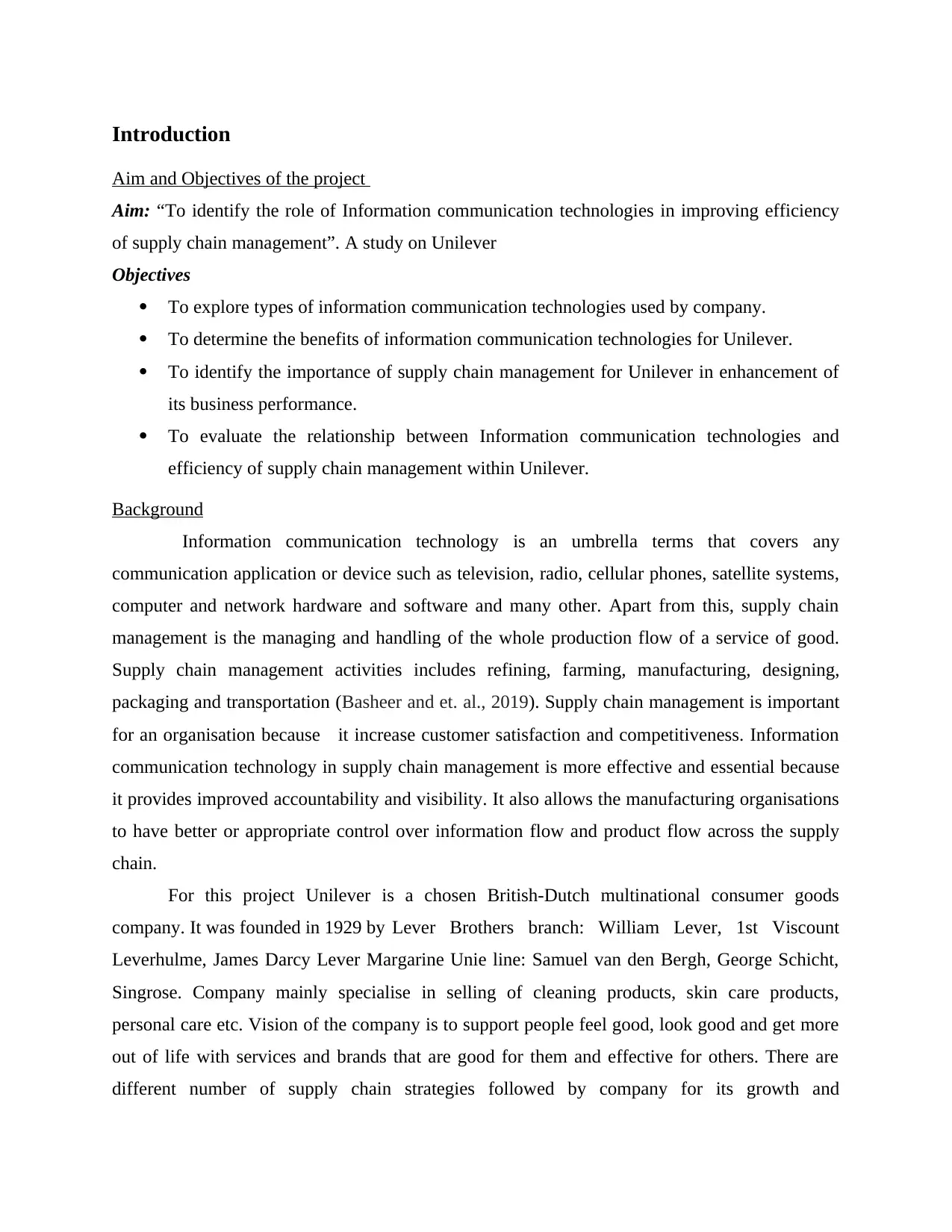
Introduction
Aim and Objectives of the project
Aim: “To identify the role of Information communication technologies in improving efficiency
of supply chain management”. A study on Unilever
Objectives
To explore types of information communication technologies used by company.
To determine the benefits of information communication technologies for Unilever.
To identify the importance of supply chain management for Unilever in enhancement of
its business performance.
To evaluate the relationship between Information communication technologies and
efficiency of supply chain management within Unilever.
Background
Information communication technology is an umbrella terms that covers any
communication application or device such as television, radio, cellular phones, satellite systems,
computer and network hardware and software and many other. Apart from this, supply chain
management is the managing and handling of the whole production flow of a service of good.
Supply chain management activities includes refining, farming, manufacturing, designing,
packaging and transportation (Basheer and et. al., 2019). Supply chain management is important
for an organisation because it increase customer satisfaction and competitiveness. Information
communication technology in supply chain management is more effective and essential because
it provides improved accountability and visibility. It also allows the manufacturing organisations
to have better or appropriate control over information flow and product flow across the supply
chain.
For this project Unilever is a chosen British-Dutch multinational consumer goods
company. It was founded in 1929 by Lever Brothers branch: William Lever, 1st Viscount
Leverhulme, James Darcy Lever Margarine Unie line: Samuel van den Bergh, Georgе Schicht,
Singrose. Company mainly specialise in selling of cleaning products, skin care products,
personal care etc. Vision of the company is to support people feel good, look good and get more
out of life with services and brands that are good for them and effective for others. There are
different number of supply chain strategies followed by company for its growth and
Aim and Objectives of the project
Aim: “To identify the role of Information communication technologies in improving efficiency
of supply chain management”. A study on Unilever
Objectives
To explore types of information communication technologies used by company.
To determine the benefits of information communication technologies for Unilever.
To identify the importance of supply chain management for Unilever in enhancement of
its business performance.
To evaluate the relationship between Information communication technologies and
efficiency of supply chain management within Unilever.
Background
Information communication technology is an umbrella terms that covers any
communication application or device such as television, radio, cellular phones, satellite systems,
computer and network hardware and software and many other. Apart from this, supply chain
management is the managing and handling of the whole production flow of a service of good.
Supply chain management activities includes refining, farming, manufacturing, designing,
packaging and transportation (Basheer and et. al., 2019). Supply chain management is important
for an organisation because it increase customer satisfaction and competitiveness. Information
communication technology in supply chain management is more effective and essential because
it provides improved accountability and visibility. It also allows the manufacturing organisations
to have better or appropriate control over information flow and product flow across the supply
chain.
For this project Unilever is a chosen British-Dutch multinational consumer goods
company. It was founded in 1929 by Lever Brothers branch: William Lever, 1st Viscount
Leverhulme, James Darcy Lever Margarine Unie line: Samuel van den Bergh, Georgе Schicht,
Singrose. Company mainly specialise in selling of cleaning products, skin care products,
personal care etc. Vision of the company is to support people feel good, look good and get more
out of life with services and brands that are good for them and effective for others. There are
different number of supply chain strategies followed by company for its growth and
⊘ This is a preview!⊘
Do you want full access?
Subscribe today to unlock all pages.

Trusted by 1+ million students worldwide
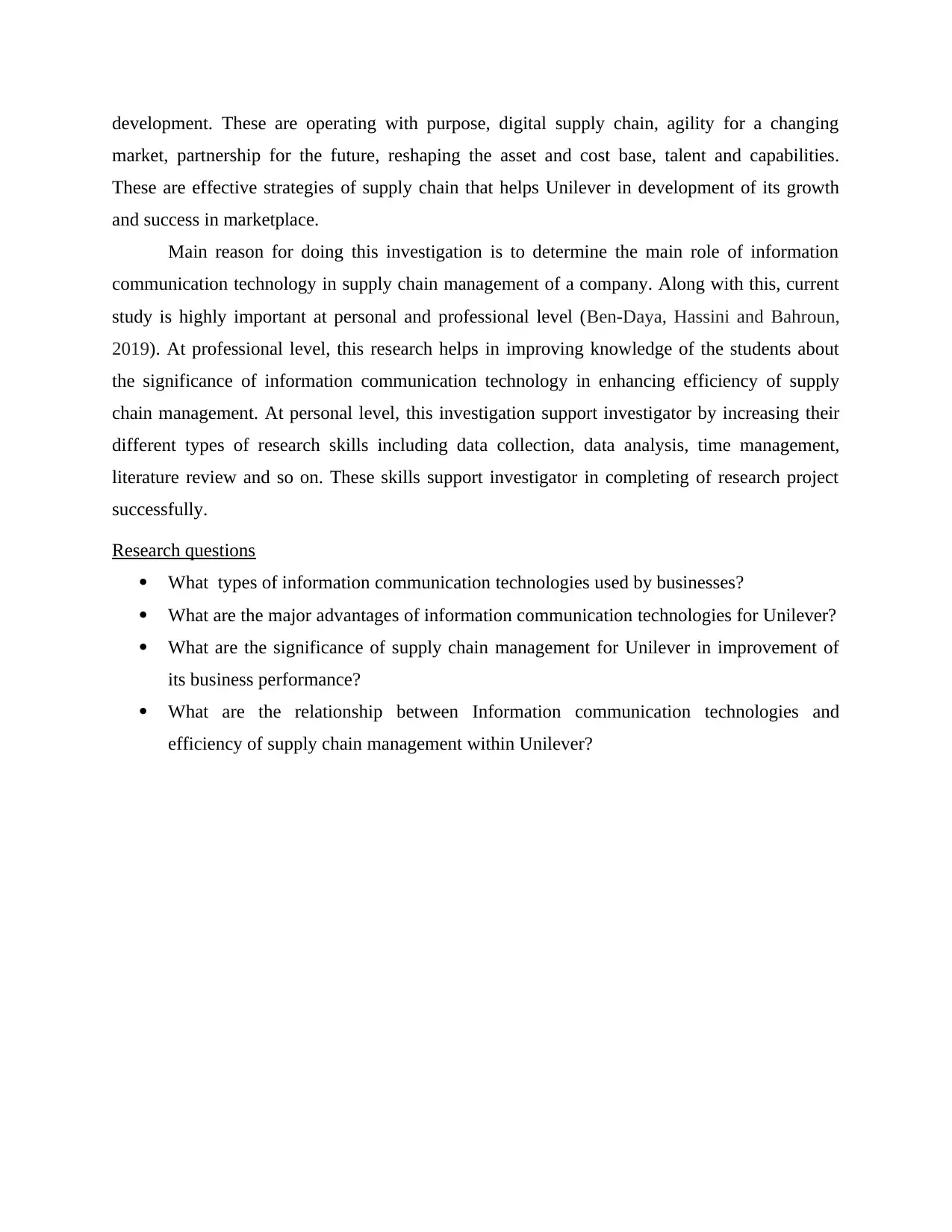
development. These are operating with purpose, digital supply chain, agility for a changing
market, partnership for the future, reshaping the asset and cost base, talent and capabilities.
These are effective strategies of supply chain that helps Unilever in development of its growth
and success in marketplace.
Main reason for doing this investigation is to determine the main role of information
communication technology in supply chain management of a company. Along with this, current
study is highly important at personal and professional level (Ben-Daya, Hassini and Bahroun,
2019). At professional level, this research helps in improving knowledge of the students about
the significance of information communication technology in enhancing efficiency of supply
chain management. At personal level, this investigation support investigator by increasing their
different types of research skills including data collection, data analysis, time management,
literature review and so on. These skills support investigator in completing of research project
successfully.
Research questions
What types of information communication technologies used by businesses?
What are the major advantages of information communication technologies for Unilever?
What are the significance of supply chain management for Unilever in improvement of
its business performance?
What are the relationship between Information communication technologies and
efficiency of supply chain management within Unilever?
market, partnership for the future, reshaping the asset and cost base, talent and capabilities.
These are effective strategies of supply chain that helps Unilever in development of its growth
and success in marketplace.
Main reason for doing this investigation is to determine the main role of information
communication technology in supply chain management of a company. Along with this, current
study is highly important at personal and professional level (Ben-Daya, Hassini and Bahroun,
2019). At professional level, this research helps in improving knowledge of the students about
the significance of information communication technology in enhancing efficiency of supply
chain management. At personal level, this investigation support investigator by increasing their
different types of research skills including data collection, data analysis, time management,
literature review and so on. These skills support investigator in completing of research project
successfully.
Research questions
What types of information communication technologies used by businesses?
What are the major advantages of information communication technologies for Unilever?
What are the significance of supply chain management for Unilever in improvement of
its business performance?
What are the relationship between Information communication technologies and
efficiency of supply chain management within Unilever?
Paraphrase This Document
Need a fresh take? Get an instant paraphrase of this document with our AI Paraphraser
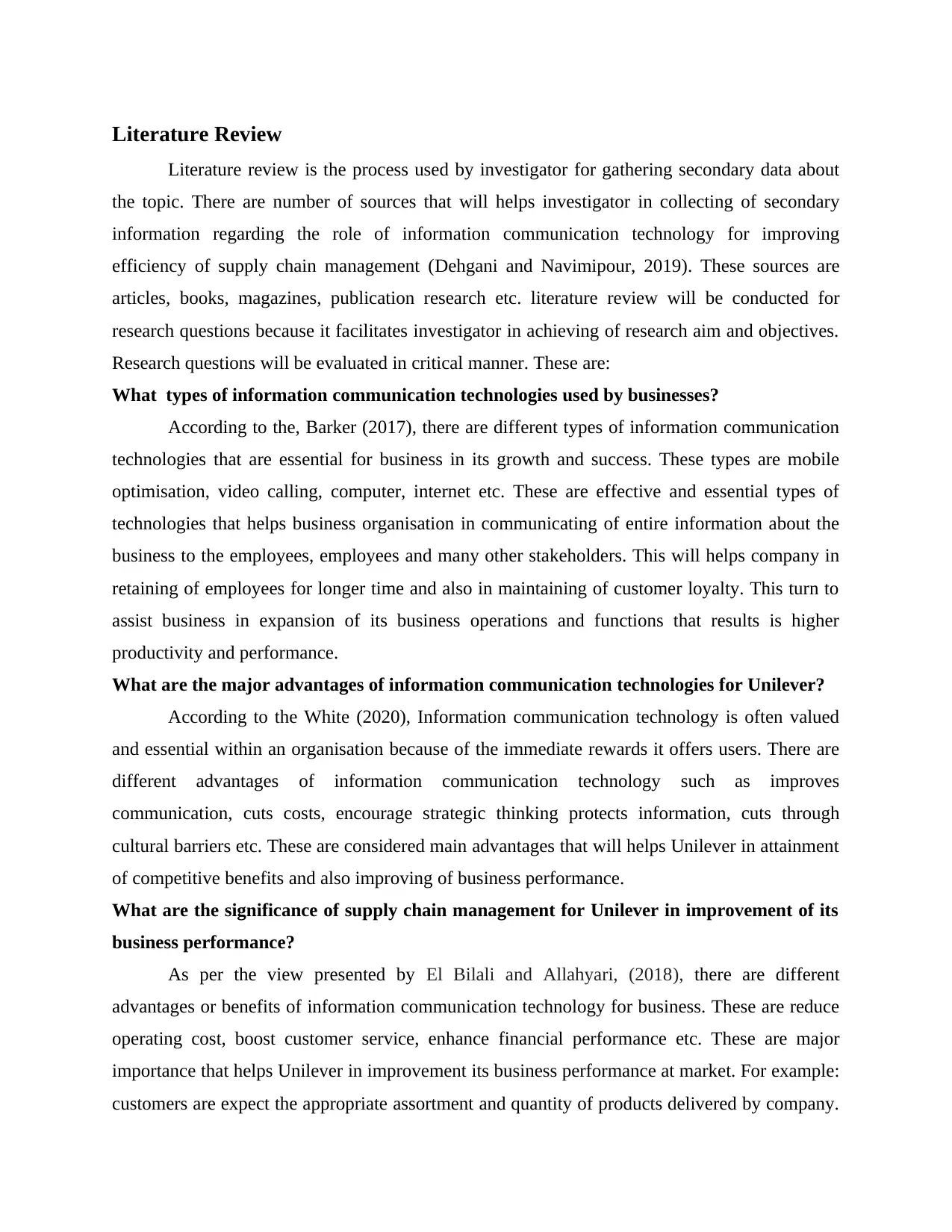
Literature Review
Literature review is the process used by investigator for gathering secondary data about
the topic. There are number of sources that will helps investigator in collecting of secondary
information regarding the role of information communication technology for improving
efficiency of supply chain management (Dehgani and Navimipour, 2019). These sources are
articles, books, magazines, publication research etc. literature review will be conducted for
research questions because it facilitates investigator in achieving of research aim and objectives.
Research questions will be evaluated in critical manner. These are:
What types of information communication technologies used by businesses?
According to the, Barker (2017), there are different types of information communication
technologies that are essential for business in its growth and success. These types are mobile
optimisation, video calling, computer, internet etc. These are effective and essential types of
technologies that helps business organisation in communicating of entire information about the
business to the employees, employees and many other stakeholders. This will helps company in
retaining of employees for longer time and also in maintaining of customer loyalty. This turn to
assist business in expansion of its business operations and functions that results is higher
productivity and performance.
What are the major advantages of information communication technologies for Unilever?
According to the White (2020), Information communication technology is often valued
and essential within an organisation because of the immediate rewards it offers users. There are
different advantages of information communication technology such as improves
communication, cuts costs, encourage strategic thinking protects information, cuts through
cultural barriers etc. These are considered main advantages that will helps Unilever in attainment
of competitive benefits and also improving of business performance.
What are the significance of supply chain management for Unilever in improvement of its
business performance?
As per the view presented by El Bilali and Allahyari, (2018), there are different
advantages or benefits of information communication technology for business. These are reduce
operating cost, boost customer service, enhance financial performance etc. These are major
importance that helps Unilever in improvement its business performance at market. For example:
customers are expect the appropriate assortment and quantity of products delivered by company.
Literature review is the process used by investigator for gathering secondary data about
the topic. There are number of sources that will helps investigator in collecting of secondary
information regarding the role of information communication technology for improving
efficiency of supply chain management (Dehgani and Navimipour, 2019). These sources are
articles, books, magazines, publication research etc. literature review will be conducted for
research questions because it facilitates investigator in achieving of research aim and objectives.
Research questions will be evaluated in critical manner. These are:
What types of information communication technologies used by businesses?
According to the, Barker (2017), there are different types of information communication
technologies that are essential for business in its growth and success. These types are mobile
optimisation, video calling, computer, internet etc. These are effective and essential types of
technologies that helps business organisation in communicating of entire information about the
business to the employees, employees and many other stakeholders. This will helps company in
retaining of employees for longer time and also in maintaining of customer loyalty. This turn to
assist business in expansion of its business operations and functions that results is higher
productivity and performance.
What are the major advantages of information communication technologies for Unilever?
According to the White (2020), Information communication technology is often valued
and essential within an organisation because of the immediate rewards it offers users. There are
different advantages of information communication technology such as improves
communication, cuts costs, encourage strategic thinking protects information, cuts through
cultural barriers etc. These are considered main advantages that will helps Unilever in attainment
of competitive benefits and also improving of business performance.
What are the significance of supply chain management for Unilever in improvement of its
business performance?
As per the view presented by El Bilali and Allahyari, (2018), there are different
advantages or benefits of information communication technology for business. These are reduce
operating cost, boost customer service, enhance financial performance etc. These are major
importance that helps Unilever in improvement its business performance at market. For example:
customers are expect the appropriate assortment and quantity of products delivered by company.
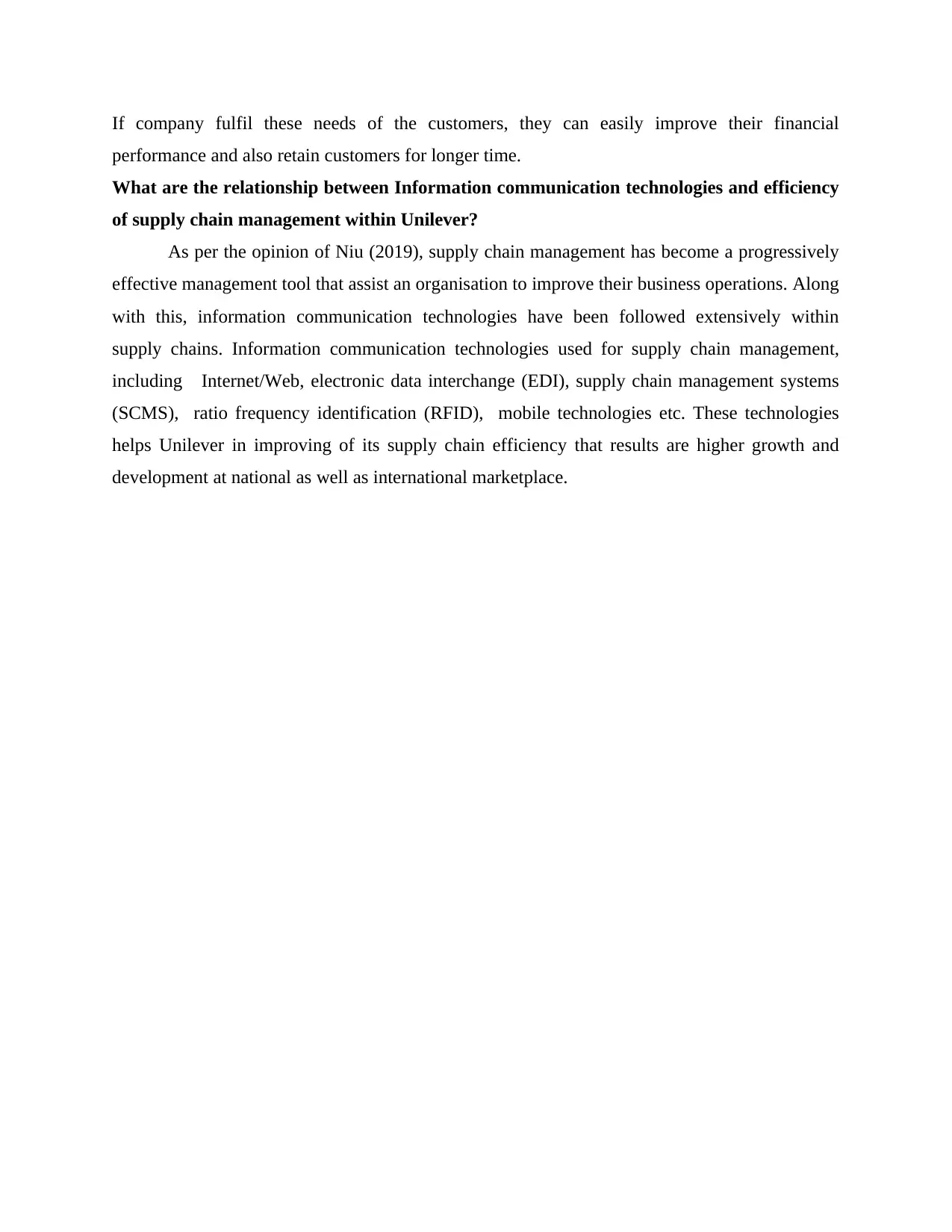
If company fulfil these needs of the customers, they can easily improve their financial
performance and also retain customers for longer time.
What are the relationship between Information communication technologies and efficiency
of supply chain management within Unilever?
As per the opinion of Niu (2019), supply chain management has become a progressively
effective management tool that assist an organisation to improve their business operations. Along
with this, information communication technologies have been followed extensively within
supply chains. Information communication technologies used for supply chain management,
including Internet/Web, electronic data interchange (EDI), supply chain management systems
(SCMS), ratio frequency identification (RFID), mobile technologies etc. These technologies
helps Unilever in improving of its supply chain efficiency that results are higher growth and
development at national as well as international marketplace.
performance and also retain customers for longer time.
What are the relationship between Information communication technologies and efficiency
of supply chain management within Unilever?
As per the opinion of Niu (2019), supply chain management has become a progressively
effective management tool that assist an organisation to improve their business operations. Along
with this, information communication technologies have been followed extensively within
supply chains. Information communication technologies used for supply chain management,
including Internet/Web, electronic data interchange (EDI), supply chain management systems
(SCMS), ratio frequency identification (RFID), mobile technologies etc. These technologies
helps Unilever in improving of its supply chain efficiency that results are higher growth and
development at national as well as international marketplace.
⊘ This is a preview!⊘
Do you want full access?
Subscribe today to unlock all pages.

Trusted by 1+ million students worldwide
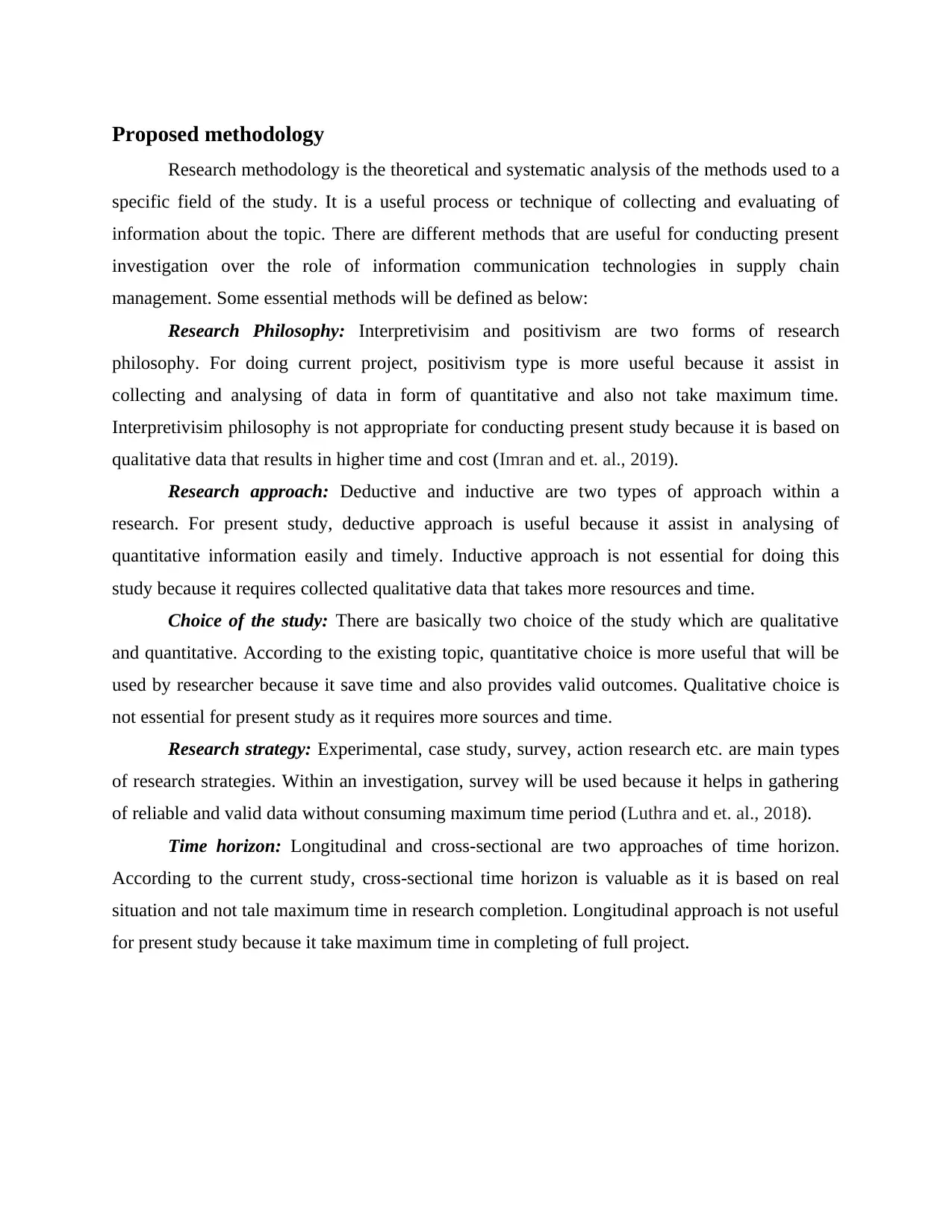
Proposed methodology
Research methodology is the theoretical and systematic analysis of the methods used to a
specific field of the study. It is a useful process or technique of collecting and evaluating of
information about the topic. There are different methods that are useful for conducting present
investigation over the role of information communication technologies in supply chain
management. Some essential methods will be defined as below:
Research Philosophy: Interpretivisim and positivism are two forms of research
philosophy. For doing current project, positivism type is more useful because it assist in
collecting and analysing of data in form of quantitative and also not take maximum time.
Interpretivisim philosophy is not appropriate for conducting present study because it is based on
qualitative data that results in higher time and cost (Imran and et. al., 2019).
Research approach: Deductive and inductive are two types of approach within a
research. For present study, deductive approach is useful because it assist in analysing of
quantitative information easily and timely. Inductive approach is not essential for doing this
study because it requires collected qualitative data that takes more resources and time.
Choice of the study: There are basically two choice of the study which are qualitative
and quantitative. According to the existing topic, quantitative choice is more useful that will be
used by researcher because it save time and also provides valid outcomes. Qualitative choice is
not essential for present study as it requires more sources and time.
Research strategy: Experimental, case study, survey, action research etc. are main types
of research strategies. Within an investigation, survey will be used because it helps in gathering
of reliable and valid data without consuming maximum time period (Luthra and et. al., 2018).
Time horizon: Longitudinal and cross-sectional are two approaches of time horizon.
According to the current study, cross-sectional time horizon is valuable as it is based on real
situation and not tale maximum time in research completion. Longitudinal approach is not useful
for present study because it take maximum time in completing of full project.
Research methodology is the theoretical and systematic analysis of the methods used to a
specific field of the study. It is a useful process or technique of collecting and evaluating of
information about the topic. There are different methods that are useful for conducting present
investigation over the role of information communication technologies in supply chain
management. Some essential methods will be defined as below:
Research Philosophy: Interpretivisim and positivism are two forms of research
philosophy. For doing current project, positivism type is more useful because it assist in
collecting and analysing of data in form of quantitative and also not take maximum time.
Interpretivisim philosophy is not appropriate for conducting present study because it is based on
qualitative data that results in higher time and cost (Imran and et. al., 2019).
Research approach: Deductive and inductive are two types of approach within a
research. For present study, deductive approach is useful because it assist in analysing of
quantitative information easily and timely. Inductive approach is not essential for doing this
study because it requires collected qualitative data that takes more resources and time.
Choice of the study: There are basically two choice of the study which are qualitative
and quantitative. According to the existing topic, quantitative choice is more useful that will be
used by researcher because it save time and also provides valid outcomes. Qualitative choice is
not essential for present study as it requires more sources and time.
Research strategy: Experimental, case study, survey, action research etc. are main types
of research strategies. Within an investigation, survey will be used because it helps in gathering
of reliable and valid data without consuming maximum time period (Luthra and et. al., 2018).
Time horizon: Longitudinal and cross-sectional are two approaches of time horizon.
According to the current study, cross-sectional time horizon is valuable as it is based on real
situation and not tale maximum time in research completion. Longitudinal approach is not useful
for present study because it take maximum time in completing of full project.
Paraphrase This Document
Need a fresh take? Get an instant paraphrase of this document with our AI Paraphraser
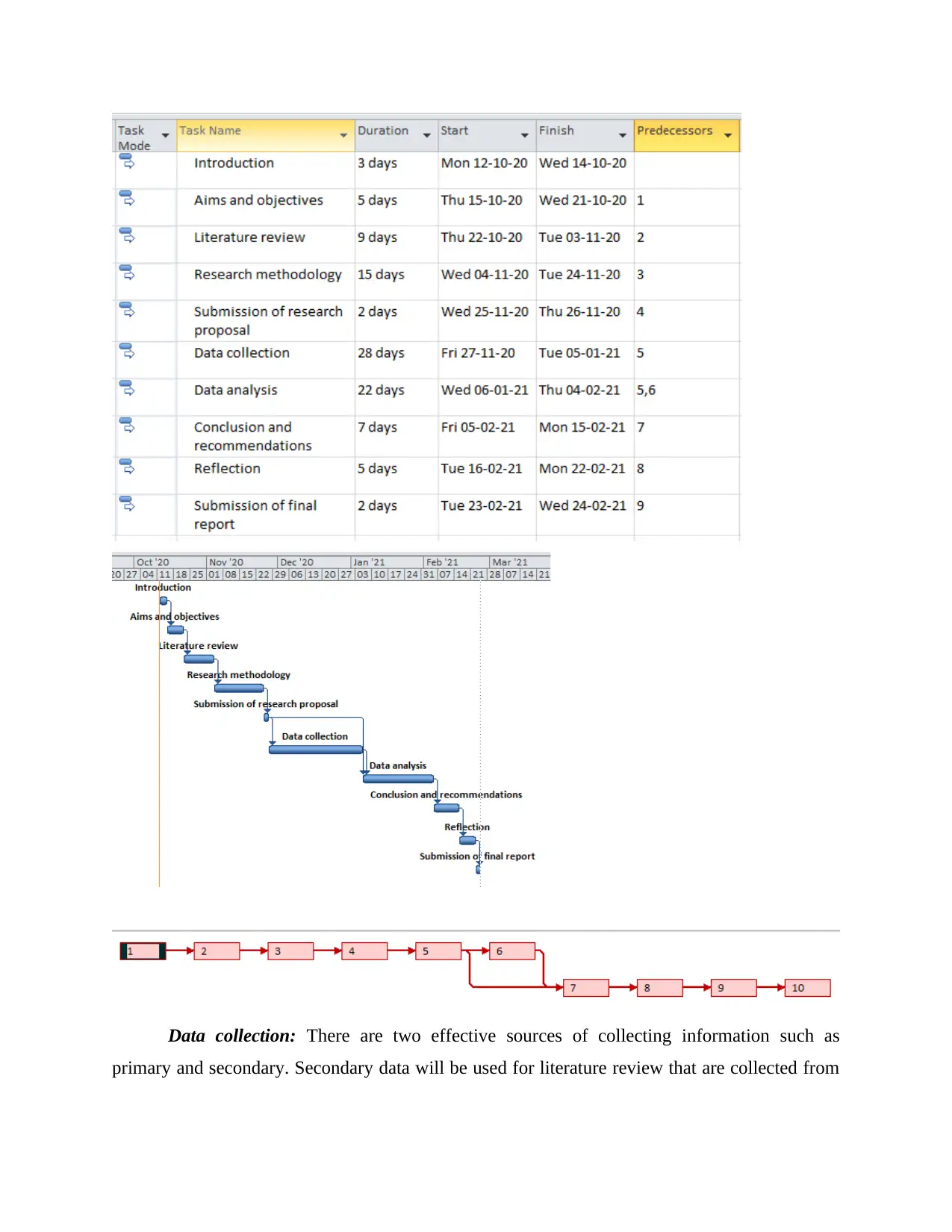
Data collection: There are two effective sources of collecting information such as
primary and secondary. Secondary data will be used for literature review that are collected from
primary and secondary. Secondary data will be used for literature review that are collected from
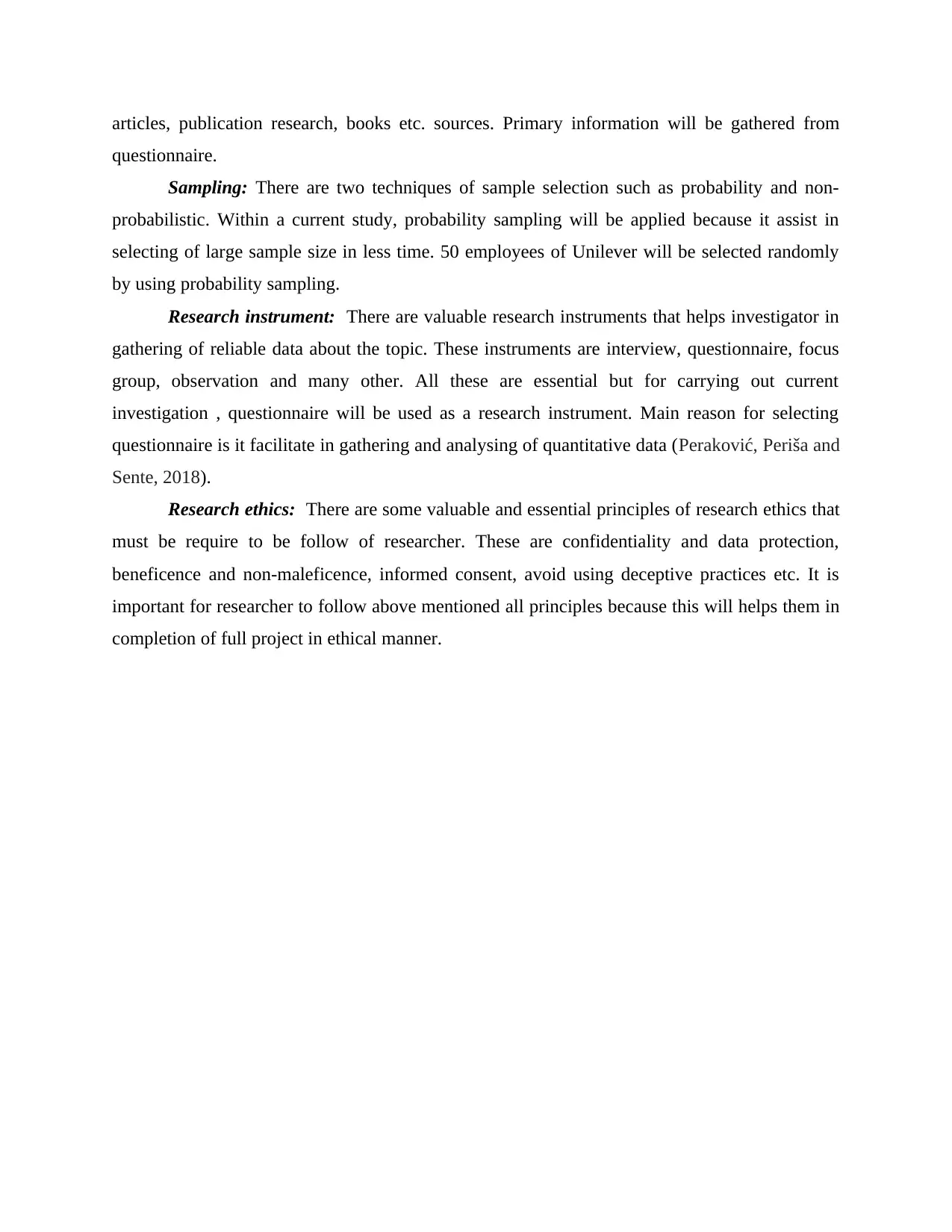
articles, publication research, books etc. sources. Primary information will be gathered from
questionnaire.
Sampling: There are two techniques of sample selection such as probability and non-
probabilistic. Within a current study, probability sampling will be applied because it assist in
selecting of large sample size in less time. 50 employees of Unilever will be selected randomly
by using probability sampling.
Research instrument: There are valuable research instruments that helps investigator in
gathering of reliable data about the topic. These instruments are interview, questionnaire, focus
group, observation and many other. All these are essential but for carrying out current
investigation , questionnaire will be used as a research instrument. Main reason for selecting
questionnaire is it facilitate in gathering and analysing of quantitative data (Peraković, Periša and
Sente, 2018).
Research ethics: There are some valuable and essential principles of research ethics that
must be require to be follow of researcher. These are confidentiality and data protection,
beneficence and non-maleficence, informed consent, avoid using deceptive practices etc. It is
important for researcher to follow above mentioned all principles because this will helps them in
completion of full project in ethical manner.
questionnaire.
Sampling: There are two techniques of sample selection such as probability and non-
probabilistic. Within a current study, probability sampling will be applied because it assist in
selecting of large sample size in less time. 50 employees of Unilever will be selected randomly
by using probability sampling.
Research instrument: There are valuable research instruments that helps investigator in
gathering of reliable data about the topic. These instruments are interview, questionnaire, focus
group, observation and many other. All these are essential but for carrying out current
investigation , questionnaire will be used as a research instrument. Main reason for selecting
questionnaire is it facilitate in gathering and analysing of quantitative data (Peraković, Periša and
Sente, 2018).
Research ethics: There are some valuable and essential principles of research ethics that
must be require to be follow of researcher. These are confidentiality and data protection,
beneficence and non-maleficence, informed consent, avoid using deceptive practices etc. It is
important for researcher to follow above mentioned all principles because this will helps them in
completion of full project in ethical manner.
⊘ This is a preview!⊘
Do you want full access?
Subscribe today to unlock all pages.

Trusted by 1+ million students worldwide
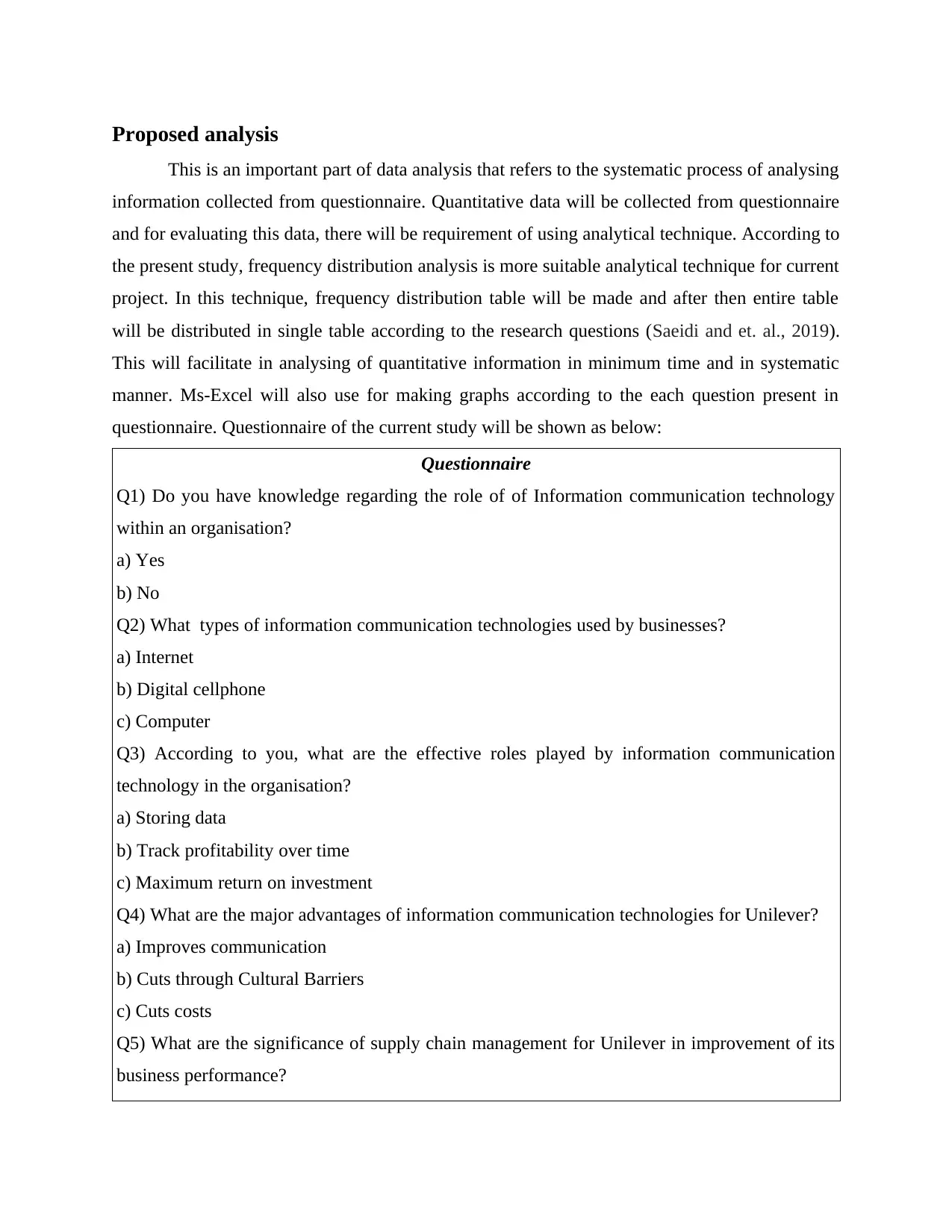
Proposed analysis
This is an important part of data analysis that refers to the systematic process of analysing
information collected from questionnaire. Quantitative data will be collected from questionnaire
and for evaluating this data, there will be requirement of using analytical technique. According to
the present study, frequency distribution analysis is more suitable analytical technique for current
project. In this technique, frequency distribution table will be made and after then entire table
will be distributed in single table according to the research questions (Saeidi and et. al., 2019).
This will facilitate in analysing of quantitative information in minimum time and in systematic
manner. Ms-Excel will also use for making graphs according to the each question present in
questionnaire. Questionnaire of the current study will be shown as below:
Questionnaire
Q1) Do you have knowledge regarding the role of of Information communication technology
within an organisation?
a) Yes
b) No
Q2) What types of information communication technologies used by businesses?
a) Internet
b) Digital cellphone
c) Computer
Q3) According to you, what are the effective roles played by information communication
technology in the organisation?
a) Storing data
b) Track profitability over time
c) Maximum return on investment
Q4) What are the major advantages of information communication technologies for Unilever?
a) Improves communication
b) Cuts through Cultural Barriers
c) Cuts costs
Q5) What are the significance of supply chain management for Unilever in improvement of its
business performance?
This is an important part of data analysis that refers to the systematic process of analysing
information collected from questionnaire. Quantitative data will be collected from questionnaire
and for evaluating this data, there will be requirement of using analytical technique. According to
the present study, frequency distribution analysis is more suitable analytical technique for current
project. In this technique, frequency distribution table will be made and after then entire table
will be distributed in single table according to the research questions (Saeidi and et. al., 2019).
This will facilitate in analysing of quantitative information in minimum time and in systematic
manner. Ms-Excel will also use for making graphs according to the each question present in
questionnaire. Questionnaire of the current study will be shown as below:
Questionnaire
Q1) Do you have knowledge regarding the role of of Information communication technology
within an organisation?
a) Yes
b) No
Q2) What types of information communication technologies used by businesses?
a) Internet
b) Digital cellphone
c) Computer
Q3) According to you, what are the effective roles played by information communication
technology in the organisation?
a) Storing data
b) Track profitability over time
c) Maximum return on investment
Q4) What are the major advantages of information communication technologies for Unilever?
a) Improves communication
b) Cuts through Cultural Barriers
c) Cuts costs
Q5) What are the significance of supply chain management for Unilever in improvement of its
business performance?
Paraphrase This Document
Need a fresh take? Get an instant paraphrase of this document with our AI Paraphraser
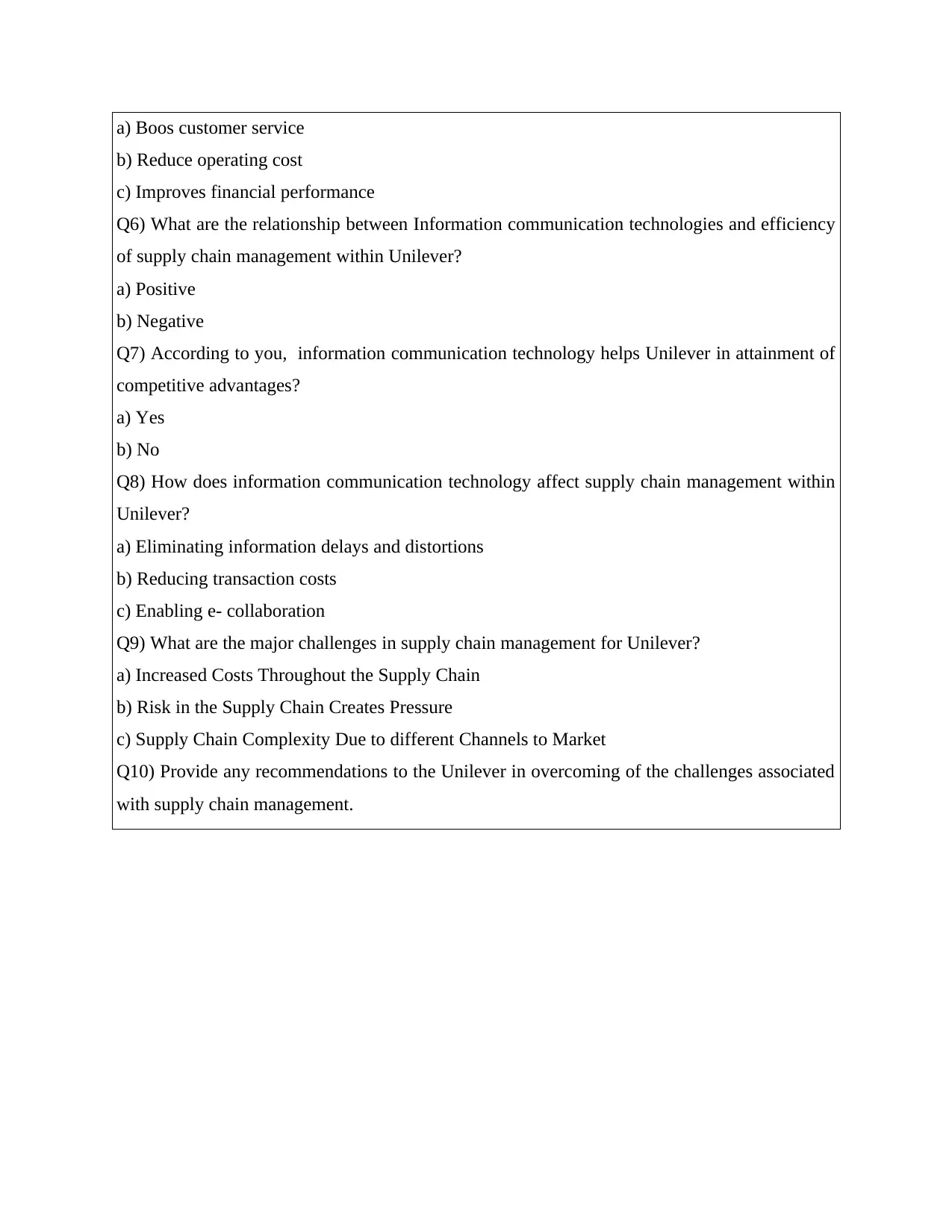
a) Boos customer service
b) Reduce operating cost
c) Improves financial performance
Q6) What are the relationship between Information communication technologies and efficiency
of supply chain management within Unilever?
a) Positive
b) Negative
Q7) According to you, information communication technology helps Unilever in attainment of
competitive advantages?
a) Yes
b) No
Q8) How does information communication technology affect supply chain management within
Unilever?
a) Eliminating information delays and distortions
b) Reducing transaction costs
c) Enabling e- collaboration
Q9) What are the major challenges in supply chain management for Unilever?
a) Increased Costs Throughout the Supply Chain
b) Risk in the Supply Chain Creates Pressure
c) Supply Chain Complexity Due to different Channels to Market
Q10) Provide any recommendations to the Unilever in overcoming of the challenges associated
with supply chain management.
b) Reduce operating cost
c) Improves financial performance
Q6) What are the relationship between Information communication technologies and efficiency
of supply chain management within Unilever?
a) Positive
b) Negative
Q7) According to you, information communication technology helps Unilever in attainment of
competitive advantages?
a) Yes
b) No
Q8) How does information communication technology affect supply chain management within
Unilever?
a) Eliminating information delays and distortions
b) Reducing transaction costs
c) Enabling e- collaboration
Q9) What are the major challenges in supply chain management for Unilever?
a) Increased Costs Throughout the Supply Chain
b) Risk in the Supply Chain Creates Pressure
c) Supply Chain Complexity Due to different Channels to Market
Q10) Provide any recommendations to the Unilever in overcoming of the challenges associated
with supply chain management.
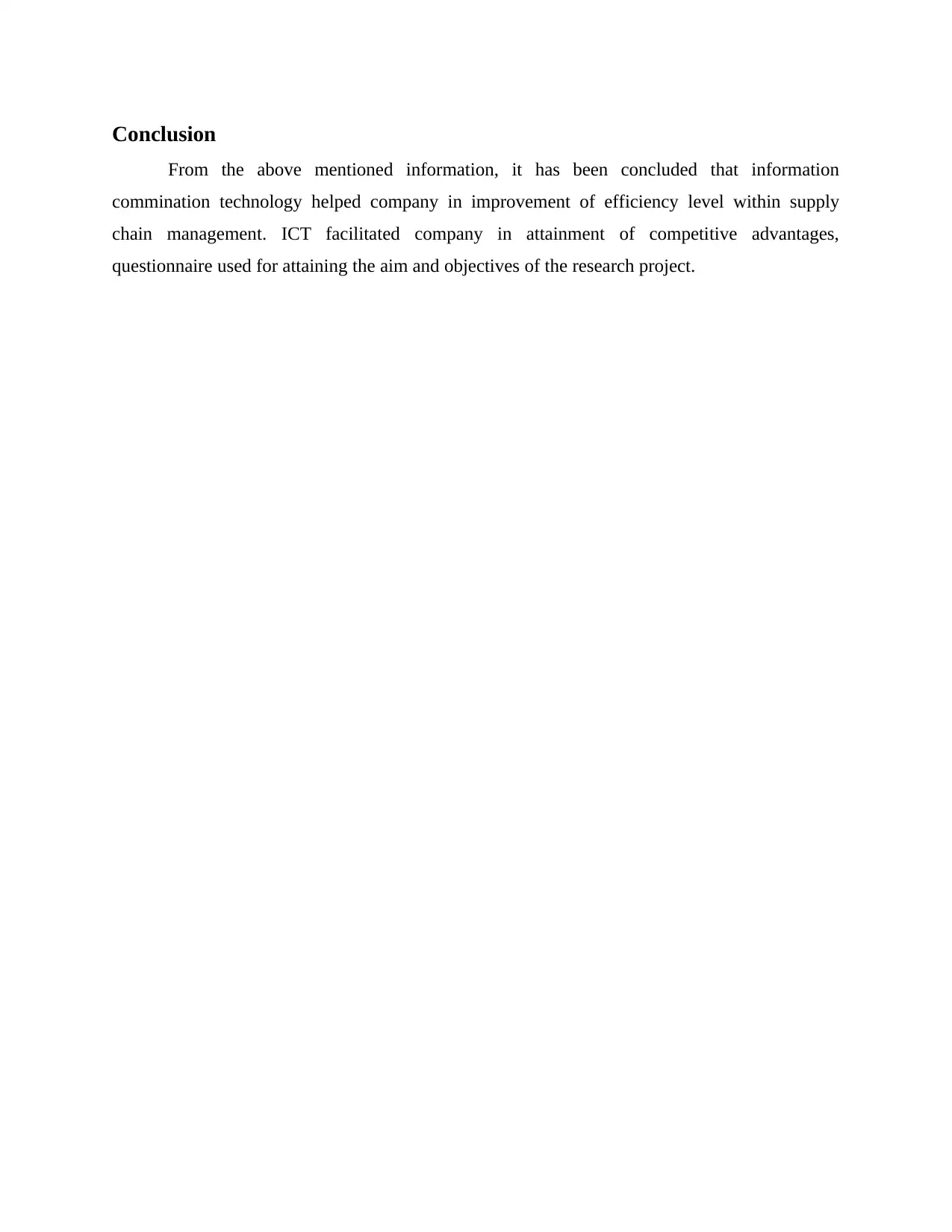
Conclusion
From the above mentioned information, it has been concluded that information
commination technology helped company in improvement of efficiency level within supply
chain management. ICT facilitated company in attainment of competitive advantages,
questionnaire used for attaining the aim and objectives of the research project.
From the above mentioned information, it has been concluded that information
commination technology helped company in improvement of efficiency level within supply
chain management. ICT facilitated company in attainment of competitive advantages,
questionnaire used for attaining the aim and objectives of the research project.
⊘ This is a preview!⊘
Do you want full access?
Subscribe today to unlock all pages.

Trusted by 1+ million students worldwide
1 out of 13
Related Documents
Your All-in-One AI-Powered Toolkit for Academic Success.
+13062052269
info@desklib.com
Available 24*7 on WhatsApp / Email
![[object Object]](/_next/static/media/star-bottom.7253800d.svg)
Unlock your academic potential
Copyright © 2020–2026 A2Z Services. All Rights Reserved. Developed and managed by ZUCOL.





